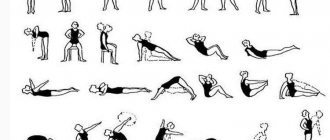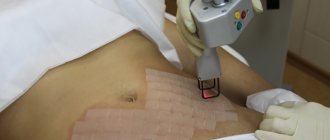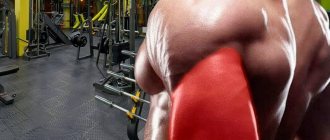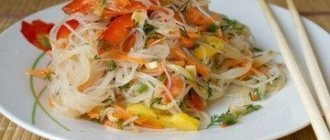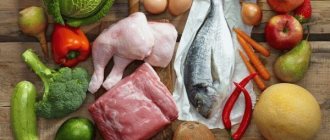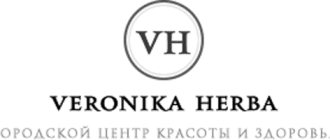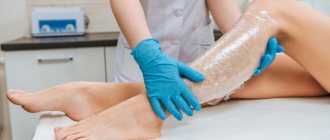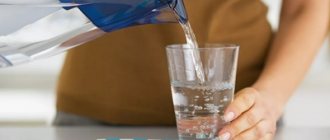What is important to know about hair
Hair is the fastest growing tissue in the body. Their length increases monthly by about 1 cm. Hair grows fastest at the age of 15-30 years; for 40-year-olds, this figure decreases noticeably. Meanwhile, this process depends on many factors, including genetics, gender, and hormonal levels. Deficiency of zinc, proteins and iron also affects the indicator. But to understand the principles of hair growth, it is important to understand what hair actually is. Hair is made up of the protein keratin (which is also the main component of nails). They are formed from 3 layers:
- external (cuticle) – thin, colorless, plays the role of a protective coating;
- medium – contains melanin, responsible for the color and shape of hair;
- internal - responsible for the reflection of light.
The living part of the hair is located under the skin, where there is a follicle with a root. And it is the follicle that draws all the necessary nutrients from the blood. It is believed that there are from 100 thousand to 350 thousand follicles on the head of an adult. By the way, researchers say that blondes have the most hair, and red-haired people have the least. Hair grows from each follicle for 1000 days (3 years), then rests for 100 days (3 months). After this, new hair grows from the follicle again. This is a model of so-called healthy growth, however, there are many factors that can destroy this pattern. And poor nutrition is one of them.
Other reasons include:
- age (over the years, hair loses strength, falls out, turns grey);
- genetics (the tendency to early baldness or graying can be transmitted from parents);
- repeated weight loss and restoration (curls become fragile and lack shine);
- Hormonal imbalance (causes significant hair loss).
Useful vitamins and minerals
Hair, being part of the complex human body, also needs multivitamins and minerals. Without receiving enough of these beneficial substances, curls stop growing and become fragile.
As a rule, to solve this problem it is enough to restore the balance of nutrients in the body.
But for this it is important to understand what role this or that substance will play for the hair and where to get it. Important vitamins
| Vitamin name | What is hair needed for? | Where to get |
| B1 (thiamine), B2 (riboflavin), B3 (niacin) | Nourishes the follicle | Beef, cheese, eggs, cereals, yeast |
| B5 (pantothenic acid) | Gives flexibility, strength, shine, prevents hair loss and graying | Peas, liver, caviar, oatmeal, cauliflower |
| B6 (pyridoxine) | Prevents dandruff | Cereals, liver, egg yolk |
| B7 (biotin) | Prevents hair loss, maintains hair strength and texture | Eggs, liver, soy, cheese, chicken, yeast |
| B9 (folic acid) | Prevents gray hair, improves growth | Nuts, grains, beans, liver, fish |
| AT 12 | Prevents baldness | Fish, eggs, chicken, milk |
| C (ascorbic acid) | Necessary for the production of collagen, an antioxidant that protects follicle cells, essential for dry hair, strengthens capillaries that supply hair with nutrients | Citrus fruits, kiwi, rose hips, broccoli, gooseberries, strawberries, blueberries |
| E (tocopherol) | Preserves the integrity of the follicle membranes, maintains the health of curls, protects against UV radiation | Seeds, nuts |
| A (beta-carotene) | Essential for healthy growth, improves the synthesis of collagen and subcutaneous fat, which acts as a natural conditioner | Sweet potatoes, carrots, peppers, orange and yellow vegetables |
| D (calciferol) | Activates hair growth | It is enough to spend 10-15 minutes in the sun every day |
Important Minerals
| Item name | What is hair needed for? | Where to get |
| Selenium | Deficiency leads to poor growth | Eggs, beef, oysters, rye bread |
| Silicon | The strength and durability of curls depends on it | Root vegetables, zucchini, cucumbers |
| Calcium | Important for rapid hair growth | Dairy products, dark green vegetables, herbs |
| Zinc | Medicine against baldness and early graying | Beef, eggs, seafood, whole grains, onions, garlic, cabbage |
| Iron | Its deficiency causes anemia and hair loss, early gray hair | Dark green vegetables, red meat, fatty fish, pomegranates, liver, eggs, buckwheat |
| Iodine | Important for the healthy functioning of the thyroid gland, which determines the rate of hair growth | Seafood, seaweed, champignons, persimmon |
| Omega-3 fatty acids | Moisturizes hair and scalp | Salmon, herring, trout, mackerel, avocado, pumpkin seeds, walnuts |
| Magnesium | Gives elasticity | Dried apricots, greens, nuts |
| Phosphorus | Responsible for elasticity and color saturation | Fish, legumes |
| Sulfur | Important for shine | Legumes, garlic, fish |
| Copper | Retains color | Chocolate, buckwheat, oatmeal, pearl barley |
What foods are good for hair?
What vitamins, minerals and proteins help hair growth the most?
Making girls' dreams of long, voluminous hair, falling in beautiful curls to the waist, come true is sometimes not an easy task if you are not aware of what is good for hair and what products. A huge number of salon procedures and home care recipes protect against damage and work on appearance.
But you shouldn’t rely only on procedures and masks that accelerate hair growth - hair growth is a process that needs to be ensured for hair from the inside of the body. Often visiting hairdressers and cosmetics stores, we forget to pay attention to the issue of nutrition, which directly affects hair growth. You should know which foods are good for hair growth and include them in your diet. It is absolutely true that long, healthy hair is a sign of overall health and a balanced intake of carbohydrates, fats, proteins, vitamins, minerals, dietary fiber and water.
The main nutrients for hair are proteins, vitamins, and minerals. Consuming them in the right proportion will ensure you grow beautiful and healthy hair. The right diet and foods that are healthy for your hair will protect against hair loss and accelerate growth by up to 90%. Food is the power of the luxurious hair you've always dreamed of.
Nutrients are elements that are biologically significant for the body and are essential for normal functioning. They are classified into macroelements and microelements, which the body must receive mainly from food.
Useful vitamins for hair that the body should get from food:
- Vitamin A
- Vitamin B7 (biotin)
- Vitamin B12
- Vitamin C
- Vitamin E
- Folic acid
- Vitamin B3 (niacin)
- Iron
- Zinc
- Magnesium
- Prenatal vitamins
- Proteins
- Omega-3 fatty acids
- Vitamin supplements
Benefit from…
...proteins
Proteins are the most important nutrients for maintaining healthy hair. A special type of protein, keratin, is responsible for their strength and flexibility. Severe protein deficiency causes baldness.
You can get the necessary proteins from red meat, fish, omelettes, chicken breast, and soy products. Also, do not forget about beans and other legumes and grains, such as rice, wheat, corn, which can provide the body with a wide range of amino acids.
| Amino acid name | What is it for? |
| L-methionine | One of the 4 sulfur-containing amino acids that maintain hair strength, provide sulfur necessary for the formation of healthy connective tissue, and is responsible for the beautiful appearance of curls |
| L-cysteine | Prevents hair loss |
| L-lysine | Deficiency leads to baldness |
| Tyrosine | Prevents early gray hair |
...carbohydrates
Depletion of the body's carbohydrate reserves often results in hair loss. This explains why many people on low-carb diets notice excessive hair loss, which tends to become dull and lifeless.
You can restore reserves of complex (healthy) carbohydrates from whole grains, brown rice, wholemeal products, and oatmeal.
...fats and fatty acids
A healthy diet includes healthy fats, which should include Omega-3 fatty acids. The best source of this substance is fish oil. Polyunsaturated fatty acids play an important role in maintaining healthy cell structure.
They act as a barrier and are necessary for the synthesis of lipids. Polyunsaturated acids are essential for dry, scaly hair. Other popular sources of these substances are walnuts, flaxseed oil, and fish oil. A deficiency of these substances usually results in baldness.
How to stop hair aging
No matter how hard a person tries to prolong youth, but with age, processes are launched in the body that cannot be prevented. This also applies to hair. Over the years, they can change color, structure, density. Meanwhile, there is a good chance of delaying this moment. Researchers say that spirulina, chlorella, broccoli, blueberries, raspberries, strawberries, blackberries, garlic, ginger and other plants that have beneficial properties will help slow down the aging of hair.
But the most important component of anti-aging nutrition is water. It is extremely important to maintain water balance in the body and prevent dry skin and hair.
What do hair problems mean?
Dull and weakened skin is the result of protein deficiency.
They get fat quickly - they lack B-group vitamins.
Very dry and split ends - they lack essential fatty acids.
Brittle, devoid of vibrant shine - a sign of tyrosine and zinc deficiency.
Thin ones are a signal of iron deficiency in the body.
Excessive hair loss is characteristic of a deficiency of vitamins B and iron.
Early gray hair is a sure sign of a lack of iron, copper, B vitamins, and the amino acid tyrosine.
Dry scalp – this problem indicates a lack of vitamin A.
They grow slowly - foods rich in biotin will help get rid of this problem.
Summary
The problem of damaged hair must be solved comprehensively and gradually. It is necessary to simultaneously use suitable cosmetics and take vitamin and mineral complexes. In severe cases, it is worth undergoing several courses of head mesotherapy. Just remember, the lack of nutrients cannot be compensated for by taking the drug at once; this process takes time and takes from three months to a year. When starting work on strengthening and improving your hair, consult a doctor who will pay attention to your health, your characteristics and the deficiency of vitamins and nutrients that your curls need.
Top list of products important for healthy hair
Fish
Salmon, herring, trout, and mackerel provide the body with Omega-3 fatty acids, proteins, vitamin B12 and iron. A deficiency of essential fatty acids leads to dry scalp and dull hair. Vegetarians can eat walnuts as an alternative.
Dark green vegetables
Broccoli, spinach, and chard provide the body with vitamins A and C, which are necessary for the production of subcutaneous fat, which is extremely important for hair follicles. Also, dark green vegetables are the best sources of iron and calcium.
Legumes
Beans, lentils and other legumes provide the body with protein, iron, zinc and biotin. It would be useful to remind you that biotin is one of the main elements that hair needs. Its deficiency leads to brittle curls.
Nuts
There are probably no nuts that are not beneficial for hair. Brazilian, for example, supplies selenium, walnuts contain zinc, alpha-linolenic acid, Omega-3 fatty acids, which maintain healthy curls. Cashews and almonds are rich in zinc, the deficiency of which causes baldness.
Bird
Poultry is a source of high-quality protein and iron with high bioavailability. Weak and brittle hair is a sign that it is not getting enough proteins.
Eggs
This product is important for hair as an excellent source of biotin, protein and vitamin B12, which are important for beautiful curls.
Whole grain
Whole grain cereals for breakfast will provide your hair with enough iron, zinc and B vitamins.
Seafood
Seafood is typically rich in zinc, a healthy antioxidant mineral.
Low-fat dairy products
Calcium and casein, obtained from dairy products, are important elements for healthy hair growth.
Carrots, beets
These delicious, colorful vegetables are essential sources of vitamin A, potassium and magnesium for the body.
Almond oil
Contains many nutrients, including vitamin E, which keeps hair shiny and strong. Studies show that daily use of this product accelerates hair growth by 42%.
Cinnamon
This spice improves blood circulation, resulting in more nutrients and oxygen reaching the hair follicles.
How to speed up hair growth as much as possible?
To increase the rate of hair growth, you need an integrated approach that will stimulate keratogenesis from the inside and outside, while maintaining and consolidating the result. All effects will predominantly affect curls that are in the anagen phase and a little - catagen.
Nutrition to accelerate hair growth
What is it for?
Long hair requires a balanced diet. This is logical: the longer the hair, the more “building blocks” - nutrients - it needs. The lack of “building materials” leads to the fact that the keratin structure cannot grow to its maximum, moreover, even the grown part will have certain flaws. With poor nutrition, hair is thin, brittle, dull, and very weak. Hair consists of 78% keratin, enriched with vitamins and microelements (1%), 15% water, and 6% lipids (fats). Based on this, you can understand what you need to eat in order for your curls to grow better.
- Keratin, from which hair is built, is a protein, so the future Rapunzel’s diet should have enough protein. Just enough, not too much - an excess of protein foods can lead to serious kidney problems. The required portion of protein is a quarter of your plate at each meal.
- You should not give up fats - they are involved in the production of an oily secretion that envelops the hair, protecting it from splitting and dehydration. A lack of fat simply will not allow hair to grow to the desired length - it will break off and fall out. Therefore, fatty fish, nuts, and dairy products should become an essential part of your diet.
- Fish and dairy products are a source of not only protein and fat, but also calcium. This macronutrient takes an active part in the process of hair growth. To make your hair grow quickly and be beautiful, get into the habit of drinking a glass of milk or kefir before going to bed.
- Hair will not be able to grow quickly if there is little water in the body. Water helps metabolism in the follicle to proceed normally, i.e. growth processes will proceed safely only in the presence of water. Water also makes curls elastic, elastic, and strong.
- You cannot grow long and beautiful hair if your diet does not contain enough greens, vegetables and fruits. Hair growth and its appearance entirely depend on the balance of vitamins and minerals in the body. So fill half your plate at each meal with a vegetable salad, and snack on a couple of pieces of fruit twice a day.
- Sometimes it is useful to take a course of pharmaceutical drugs - vitamin complexes, yeast, fish oil, lecithin. Such supplements compensate for errors in the diet, sometimes significantly accelerating hair growth. However, you should not prescribe medications yourself - it is better to consult a trichologist or therapist.
| Attention! Hair growth stops in winter precisely because of a lack of vitamins. Groups A, B, C and E are organic substances that accelerate hair growth. It is better to take vitamin complexes in the morning, after meals - this way they are better absorbed by the body. |
Hair growth will accelerate... blood flow
What is it for?
If nutrients are the “building materials” for hair, then blood flow is their main “builder”. The blood flow delivers the necessary elements to the hair follicle, removes decay products from there, promoting the active functioning of the follicle. Those who dream of long locks need to regularly resort to the help of both substances and actions that cause blood flow to the follicles. In fact, this is how some young ladies manage to increase their hair length very quickly: you can find information online that curls grow by 3–4 cm in a month. What should you do to speed up hair growth?
- Our head is the highest point of the body. Blood has to overcome gravity to rise up, and various disturbances in the functioning of blood vessels can make the nutrition of the scalp quite poor. Try inverted yoga poses or just lie and hang upside down for 1-2 minutes. in a day.
- Use locally irritating masks. Well-known folk remedies are mustard, onion, cinnamon, red pepper, etc. Hot ingredients are mixed with natural oils and applied to the scalp. You should feel how the mask bakes your skin, but do not overdo it - if you overuse it, you can get burned.
- Exfoliate your scalp once a month. Using light circular movements, rub the skin with prepared compounds or salt/soda mixed with some natural oil. Afterwards, wash your hair. The procedure will cleanse the pores and improve the flow of blood and oxygen to the follicles.
- Exercise regularly. Physical exercise improves blood circulation throughout the body, stimulating the smooth functioning of the body, including the hair follicles.
- The easiest way to increase blood flow in the scalp is through regular brushing. Comb thoroughly in different directions in the mornings and evenings. First, detangle your hair, and only then start using a massage brush.
- Stimulate additional blood flow to your head with massage. Using your fingertips, gently and rhythmically massage the skin in the forehead and temples, then the rest of the head. You can use various devices: needle applicators, special massagers. Perform a massage 1-2 times a week.
- Along with a head massage, do a neck massage. Computers, smartphones, a sedentary lifestyle - all this provokes scoliosis, osteochondrosis and other disorders that provoke compression of blood vessels. Boost your blood circulation to help your hair.
| Attention! For adherents of a healthy lifestyle, curls grow much faster and look luxurious. After a day full of physical activity, deep, restful sleep certainly follows. In the deep phase of sleep, the cells of our body are intensively restored, which has a positive effect on the functioning of hair follicles and causes healthy hair growth. |
Stimulants-activators
What is it for?
After using activators, the tone of the hair follicles increases: the cells in them begin to divide more intensively, even dormant follicles can start working, causing increased hair growth. In addition, these drugs compensate for the lack of nutritional components in the scalp and reduce the number of pathogenic microorganisms on it. Typically these products contain:
- components that enhance blood circulation (pepper, citrus extracts, etc.);
- substances that stimulate metabolism at the follicle level, including hormones;
- collagen, elastin, amino acids;
- organic acids: nicotinic, folic, etc.;
- depanthenol;
- natural oils: shea, coconut, burdock, etc.;
- vitamins and minerals: A, B, F, E, zinc, sulfur, etc.
Activators are usually produced in separate series for women and men, taking into account the specifics of gender. A few months after stopping the drug, the curls return to their usual growth rates.
How to use hair growth activator?
- Follow the instructions and recommendations of your doctor - as a rule, such products are not intended for frequent, let alone daily, use.
- Activator shampoos are used somewhat differently than regular ones: they must be left on the scalp for at least 5 minutes. and longer so that the components have time to act.
- To enhance the effect, use other products from the designated series: masks, lotions, serums, balms, etc.
- Typically, activator products (except shampoos and masks) do not require rinsing. Those with oily scalp should be careful not to overdose the product and achieve the effect of greasy strands.
- There are special activators designed for hair weakened by coloring and heat treatment.
| Important! Having set yourself the goal of increasing the growth of strands, seek advice from a specialist. A trichologist will examine the condition of your body and suggest a way to quickly achieve results. It is especially important to consult a professional when choosing medications containing hormones - never prescribe them yourself! |
What will help the length?
Providing the follicle with sufficient nutrition for the “building” of hair, taking care of its intensive work - all this is only part of the task of accelerating the growth of strands. Sometimes curls grow back quite quickly, but their owner hardly sees any growth. How does this work? The hair becomes brittle, splits, and everything that has grown is simply lost. To maintain length, use the rules of gentle hair care and traditional methods:
- Without regret, cut the ends of your hair regularly - once every 1.5–2 months. This way you will improve the health of your cut, protect the length from splitting, and ultimately gain more centimeters than you lose.
- Apply leave-in treatments or natural oils to the ends of your hair daily to prevent micro-damage to your hair.
- Sulfate-free shampoos that help the scalp stay hydrated are one of the keys to good hair growth.
- Use professional shampoos with keratin - they contain optimally sized protein molecules that can “repair” hair and maintain the quality of length.
- Rinse your strands with herbal decoctions: rosemary, nettle, burdock, sage, chamomile. The temperature of this rinse aid should be cool. Even if you rinse your hair with regular water, let it be colder - this is an additional stimulation of the follicles.
- During the period of hair growth, do not use any heat tools, including a hair dryer, and minimize the use of stylers.
- Protect your head from exposure to ultraviolet radiation and low temperatures in winter: moisture evaporating or freezing inside the hair literally tears it apart from the inside.
Take care of yourself, walk in the fresh air, eat right - and your hair will grow well and look great!


